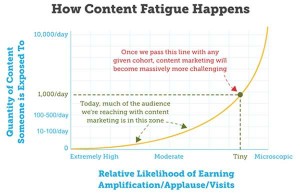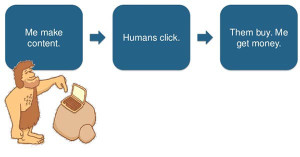Content marketing tactics and strategies that used to be awesome may now be obsolete. Successful content marketers must roll with the constantly changing industry if they want to stay successful. What “new” mistakes are you making? Here are the top five.
Mistake 1: We use content marketing for link building
Old-school SEO used to be about link building. The mantra was, “the more links to your website the better for your
business.” Content marketing rolled right into this link-building strategy, producing content to get more links. That has changed. Now, instead of the quantity of links, there are a lot of other factors that influence a site’s rank and influence. These include citations, brand mentions, and quality of links.
If you’re creating content just for the links, you’re going to run into problems. Google does not look kindly on anything that smacks of link building. So, what is the goal of content marketing?
John Hall, CEO of Influence & Co., shares five business goals for content marketing:
- Brand awareness
- Brand loyalty
- Customer education
- Customer engagement
- Talent recruitment
Noticeably absent from this list are traffic and click-through rates. Hall puts it bluntly: “Promotional links and other lovely tidbits that a company thinks will directly result in increased traffic will come off as spammy, diminishing the quality of the content, and severely damaging credibility. Readers are smart, so creating an article with the intent of driving traffic will only prevent your audience from drinking the Kool-Aid you’re serving.”
Traffic is still a good thing, and I’m all about building traffic the right way. If you get links, great. Consider it as a nice by-product, but don’t set it forth as your goal.
Mistake 2: The more content, the better
It used to be that if you produced more content, you would win the content marketing game. Today, however, content generation has surpassed search volume.
Rand Fishkin of Moz calls it “content fatigue.”
Fishkin predicts that content marketing is approaching a scary point: “Whatever you’re doing … had better be so runaway incredible that you can earn and own an audience soon, before the world of content (potentially) goes from the Wild West, to an overcrowded, hypercompetitive field where standing out to jaded, fatigued consumers is 10 times harder than it is today.”
Tao of Twitter author Mark Schaefer calls it “content shock.” Different term, same thing. He writes, “Content shock [is] the emerging marketing epoch defined when exponentially increasing volumes of content intersect our limited human capacity to consume it.”
CMI’s Joe Pulizzi has been waving the content-proliferation red flag for a while. His bottom-line assertion is this: “I’m done with more.”
Let me use an example from personal interactions. Do you absolutely love it when people talk more or talk louder? Do you enjoy the constant barrage of talking, talking, talking, and talking?
No. In conversation, more is not better. It’s not much different in content marketing. The people we really listen to are people who have something to say — something worth saying – who convey it in a way to which we prefer to listen.
Now, instead of telling content marketers to produce more, the experts are telling us to produce better. We need more nuance:
- Better content invariably means less content. We can’t produce the best possible content at breakneck speed.
- Better content has an upper threshold. You can only get so much better. Just like we reach a ceiling in quantity, there’s also a ceiling to quality. When we reach this threshold, we need to find a new direction. And that new direction might be the direction of different, not better.
- Better content depends on the audience. It doesn’t just mean longer or more detailed articles with perfect grammar and spelling. Better content is content that addresses the audience in the most powerful and direct way.
Mistake 3: If I create it, they will come
The famous line from the movie Field of Dreams: “If you build it, he will come,” has been paraphrased into a misguided mantra by many in the content marketing industry.
The problem is that the mantra – if you create it, they will come – is not true.
As I explained in the Advanced Guide to Content Marketing, “The secret to content marketing boils down to three things: creating great content, making sure it gets found in search engines, and promoting it to your followers.”
If you don’t market your content, your entire content marketing effort will fizzle and die.
When he speaks on why content marketing fails, Moz’s Fishkin shares this illustration:
It’s not quite that simple, a point that Fishkin makes. Let’s change the quote: “If you create itand promote it, they will come.”
Mistake 4: A blog is the best way to do content marketing
A lot of people think that content marketing means “blogging.” Content marketing is more than just creating a blog and publishing articles. That’s only one of the many forms of a successful and full-orbed content marketing strategy.
There are plenty of forms of content marketing that can thrive with or without a blog:
- Infographics
- Videos
- eBooks
- Guides
- White papers
- SlideShare presentations
- Podcasts
- Contests/giveaways
- Live chats/hangouts
- Webinars
- Pin boards
- Screencasts
Is a blog the best means of content marketing? Maybe. I’ve found a lot of success in blogging. But blogging may not be best for every business. In fact, I know for a fact that some businesses should not rely on blogging for their content marketing efforts.
For example, let’s take a really niche industry – vibratory equipment for industrial recycling. The players in this field are not, as a whole, into reading blogs, from what I can tell. (If they are, please correct me.) A blog covering vibratory equipment for industrial recycling probably wouldn’t have the readership or ROI given the rather narrow audience. For this particular group, using content marketing tactics on LinkedIn might be more successful. LinkedIn is where key figures in the vibratory industry are gathering, talking, and connecting.
How do you figure out which method of content marketing is best? You research your audience, and learn what forms of content best connect with them.
Mistake 5: All you need is content
The phrase, “content marketing,” is misleading because you might think that the content itself is the marketing. Actually, you need to ensure one piece of content – a call-to-action – is included to make it true content marketing designed to help your business goals. In Social Media Today, Sarah Quinn writes:
“Call-to-actions (or CTAs) are the real moneymakers, and seamlessly incorporating them into your content experience is key for conversion. Whether the action you’re trying to get people to take is to subscribe to your blog or download an eBook, that CTA should be contextual. Put yourself in the position of the people whom you want to respond — is the CTA relevant? How will they find it? At what point are they most likely to click?”
You don’t want your content to turn into a sales pitch. No one wants that. But you can introduce relevant CTAs where appropriate. You can generate leads without being salesy. Content and marketing go together, and one should complement the other.
If you persist in content marketing, but avoid mentioning your product, your service, or your solution, then your content marketing efforts won’t have the ROI that they deserve.
Source: 5 Mistakes That Hold Back Your Content Marketing BLOG
Author: Neil Patel
Referenced site: http://contentmarketinginstitute.com/2014/11/5-mistakes-hold-back-your-content-marketing/



